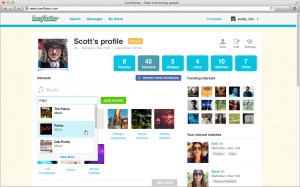The idea of matching prospective dates based on shared interests is about as old as dating itself. But understanding how one set of interests relate to another, certainly at scale, is arguably something that machines can do a lot more efficiently than humans, so why not harness that capability for match-making purposes. Loveflutter, which soft-launched in New York last month, and gets a UK push today, aims to do just that.
Powered by Freebase, the 37-million strong open database of people, places and things acquired by Google in 2010 and now part of the search giant’s Knowledge Graph, the online dating site connects people based on shared interests.
 After importing your Facebook “Likes” or entering interests manually, Loveflutter goes to work to show you matches who like the same kinds of music, books, movies, TV shows, and sports, in addition to utilising standard demographic data and your location. If you like what you see, you can click the “smile” button on someone’s profile or take the first step by messaging said person, although the latter requires paid-for credits or a subscription.
After importing your Facebook “Likes” or entering interests manually, Loveflutter goes to work to show you matches who like the same kinds of music, books, movies, TV shows, and sports, in addition to utilising standard demographic data and your location. If you like what you see, you can click the “smile” button on someone’s profile or take the first step by messaging said person, although the latter requires paid-for credits or a subscription.
If the attraction is reciprocated, Loveflutter can suggest places to go on a date, based on local venues it pulls in from Foursquare.
So far, so “me-too”, you might rightfully argue.
However, the site’s use of Freebase allows its interest matching to go a little deeper. When an interest is added to your Loveflutter profile (e.g. your favourite band, book or movie), by tapping the power of Freebase, other structured data is also included, such as genre, author, or director. This is then used to make “semantic connections” between users, which provides the framework for Loveflutter’s interest-matching process.
It also enables a more flexible level of granularity when employing a user’s “interest-graph”. On the first level, exact matches of shared interests are sought e.g. two users both like the band “The Black Keys”. But the system can also zoom out a little to use broader interest criteria, such as both users like the same genre of music. That way Loveflutter is able to offer up more matches than it might otherwise, which is pretty crucial for a dating site not to feel like a ghost town (or perhaps an empty night club).
Other features of the dating site include “Verified Profiles” to denote when a user has signed up via Facebook, thus helping to reduce spam and fake profiles, something that plagues the online dating industry. There’s also Instagram-style photo filters, and badges — 24 in total — for various achievements, such as listing enough films to be deemed a movie lover and so on.
Lastly, it would be remiss not to mention the rather silly Facebook campaign that kicks off to coincide with the UK launch. For a limited time, Loveflutter says it’s only allowing “interesting people” to sign-up. To find out if you’re interesting enough to join, you’re required to take Loveflutter’s QI Test on Facebook and receive a Quirky-Interesting score.
Yes, really.
Loveflutter is co-founded by David Standen and Daigo Smith. The startup is based in London and currently bootstrapped.
(Note: For readers interested in trying out Loveflutter, I’m told that the first 1,000 who sign up using the code TECHCRUNCHLOVE will get 15 messaging credits free as well as bypass the “QI” test.)
